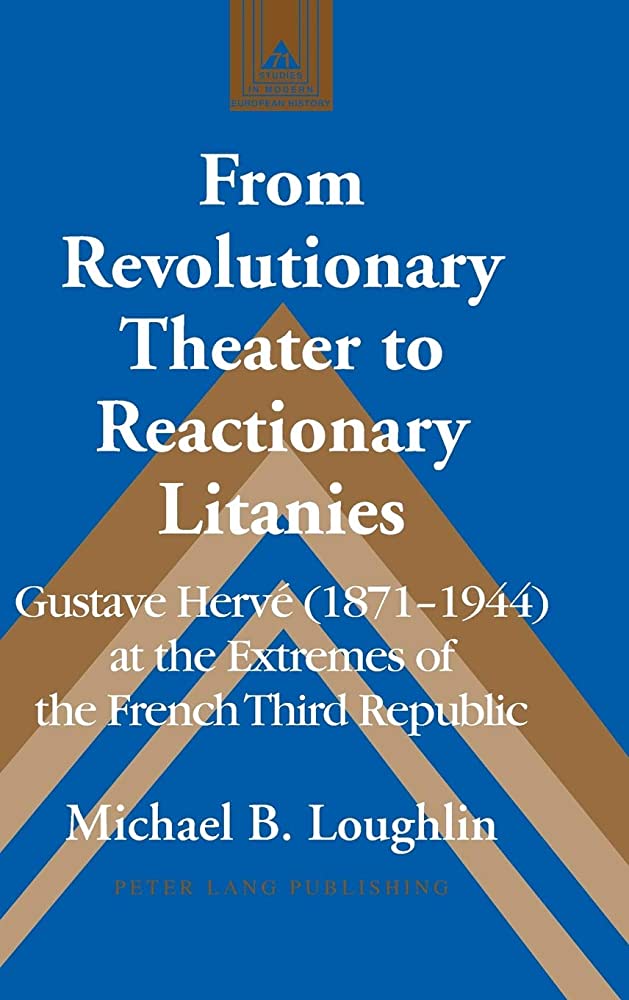Biblioteca / 2010-2019
Michael Loughlin. From Revolutionary Theater to Reactionary Litanies. Gustave Hervé (1871-1944) at the Extremes of the French Third Republic.
Nueva York: Peter Lang, 2015.
1140 páginas.
Gustave Hervé (1871-1944) parecía tener raíces tradicionales bretonas y una educación típicamente republicana. Como joven periodista socialista y profesor, adquirió notoriedad a raíz de un artículo de 1901 en el que parecía plantar la tricolor en un montón de estiércol. Cuando los socialistas franceses se unificaron en 1905, los herveistas eran una minoría influyente. El movimiento antimilitarista llamado herveismo surgió poco a poco como una cruzada quijotesca para unir a los revolucionarios contra la guerra y a favor del socialismo. Hervé no tardó en fundar un semanario, La Guerre Sociale. Durante los seis años siguientes, las campañas de prensa, los juicios, la cárcel, las manifestaciones, las huelgas y las organizaciones conspirativas mantuvieron el perfil de Hervé y vendieron periódicos. Irónicamente, Hervé anunciaba conspiraciones, lo que sugiere más teatro revolucionario que política práctica. Entre los rivales de Hervé, esa teatralidad generaba a menudo resentimiento. Mientras que el movimiento de Hervé tuvo éxito como experiencia mediática, sus competidores de izquierdas se volvieron celosos y escépticos. Como teatro revolucionario, el herveismo podría haber sido entretenido, pero los actores y parte del público a menudo confundían el arte revolucionario con la realidad política. En 1911, el ingenuo Hervé se sintió traicionado. Su fracaso a la hora de unir a los revolucionarios inició una evolución hacia la nación y su tradicional fe católica. Además de la situación internacional, un factor determinante en la evolución de Hervé hacia el nacional socialismo francés simpatizante del fascismo fueron las rivalidades existentes en el seno de la izquierda francesa. Los partidos nacional socialistas marginales de entreguerras de Hervé pretendían emplear el patriotismo y la religión para resolver los problemas franceses. En 1935 intentó reclutar a Pétain para dirigir una república autoritaria. Al perder gradualmente la esperanza en Pétain tras la caída de Francia, el envejecido Hervé depositó su fe en el socialismo cristiano.
Contents
Introduction
1 – “Un Breton de Bretagne Bretonnante”
2 – “Le Drapeau dans le Fumier”
3 – “Un Commis Voyageur Du Socialisme”
4 – L’Association Internationale Antimilitariste and L’Affiche Rouge of 1905
5 – The Foundation of La Guerre Sociale: Activist Journalism or Revolutionary Theater?
6 – Journalists and Prisoners: Hervé and the Staff at La Guerre Sociale
7 – The Midi Crisis, the Socialist Congresses at Nancy and Stuttgart and the First Campaigns
8 – The Draveil-Villeneuve-Saint-Georges Strike and Demonstrations
9 – The Postal Strikes of 1909, the Francisco Ferrer Affair, and the Liabeuf Affair
10 – Le Parti Révolutionnaire and Le Comité Révolutionnaire Antiparlementaire (C.R.A.)
11 – The Railroad Strike of 1910 and the Origins of Le Retournement
12 – The Aernoult-Rousset Affair
13 – Les Jeunes Gardes Révolutionnaires (J.G.R.) and Le Service de Sûreté Révolutionnaire (S.S.R.)
14 – La Rectification du Tir and Le Nouvel Hervéisme
15 – From “La Bataille de la Salle Wagram” Until the July Crisis
16 – La Grande Guerre: Gustave Hervé and the Origins of a French National Socialism
17 – The Postwar Crisis in France
18 – Le Parti Socialiste National of 1919
19 – De-population and De-Christianization
20 – La Victoire and Its Director During the Interwar: Plus Ça Change Plus Ça La Même Chose
21 – Financial and Circulation Problems at La Victoire
22 – Le Parti de la République Autoritaire
23 – The Reawakened Parti Socialiste National and the Elections of 1928
24 – The Syndicats Unionistes and the Milice Socialiste National
25 – Interwar Foreign Policy: The Increasingly Turbulent Eye Between Two Storms
26 – Gustave Hervé and Anti-Semitism
27 – The Stavisky Affair and the Events of February 6, 1934
28 – C’est Pétain qu’il nous faut!
29 – The Popular Front and Hervé’s Return to His Ancestral Faith
30 – Hervé’s Interwar Reactions to Fascism and Nazism
31 – Hervé, World War II, and Vichy
Appendix A. A Sociological and Prosopographic Analysis of the Drafters and Signers of L’Affiche Rouge
Appendix B. The Lyrics of “Le Chant des Jeunes Gardes” by Gaston Montéhus
Bibliography
